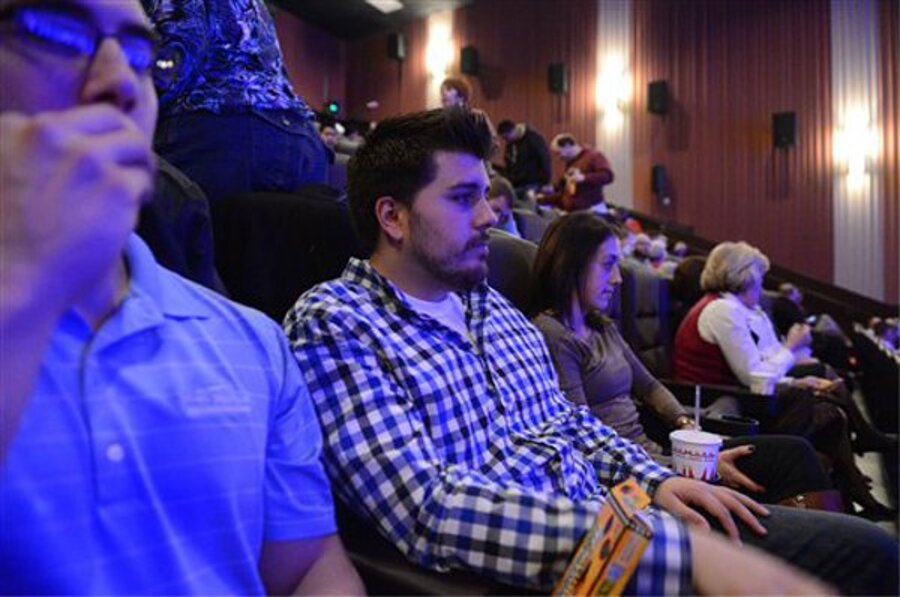Aurora theater reopens: Is movie-watching 'healing' or 'callous'?
Loading...
| Aurora, Colo.
The Colorado theater where 12 people were killed and dozens injured in a shooting rampage last year reopened Thursday with a somber remembrance ceremony and a screening of "The Hobbit" for survivors — but the pain was too much, the idea too horrific, for many Aurora victims to attend.
"We as a community have not been defeated," Aurora Mayor Steve Hogan told victims, officials, and dozens of police officers and other first responders who filled half the theater's seats at the ceremony.
"We are a community of survivors," Hogan declared. "We will not let this tragedy define us."
Pierce O'Farrill, who was wounded three times in the shooting, said: "It's important for me to come here and sit in the same seat that I was sitting in. It's all part of the healing process, I guess."
O'Farrill walked to an exit door inside the theater where he remembers the shooter emerging. "The last time I saw (the gunman) was right here," he said.
James Holmes, a former neuroscience Ph.D. student, is charged with 166 felony counts, mostly murder and attempted murder, in the July 20 shooting at the former Century 16 — now called the Century Aurora. A judge has ordered Holmes to stand trial, but he won't enter a plea until March.
Several families boycotted what they called a callous public relations ploy by the theater's owner, Cinemark. They claimed the Texas-based company didn't ask them what should happen to the theater. They said Cinemark emailed them an invitation to Thursday's reopening just two days after they struggled through Christmas without their loved ones.
"It was boilerplate Hollywood — 'Come to our movie screening,'" said Anita Busch, whose cousin, 23-year-old college student Micayla Medek, died at the theater.
The remembrance was followed by a private screening in the former theater nine of the fantasy film "The Hobbit: An Unexpected Journey."
Victims have filed at least three federal lawsuits against Cinemark Holdings Inc., alleging it should have provided security for the July 20 midnight showing of "The Dark Knight Rises," and that the exit door used by the gunman to get his weapons and re-enter should have had an alarm. In court papers, Cinemark says the tragedy was "unforeseeable and random."
"We certainly recognize all the different paths that people take to mourn, the different paths that people take to recover from unimaginable, incomprehensible loss," Gov. John Hickenlooper said at the ceremony.
"Some wanted this theater to reopen. Some didn't. Certainly both answers are correct," Hickenlooper said.
The governor credited Cinemark CEO Tim Warner for flying to Colorado after hearing about the shooting to see what he could do.
Warner told attendees that the caring response to the tragedy by first responders, the community and the world was a testament that good triumphs over evil.
Samuel Aquila, the Roman Catholic archbishop of Denver, concluded the ceremony with a prayer for the dead and the living.
"All of us in some small way suffered in your suffering," Aquila told the crowd. "The way of peace means rejecting the violence of that night."
"Let us abandon the violence we consume in the media, and the violence we may harbor in our hearts," said Aquila, who penned an opinion article, published in The Denver Post on Thursday, criticizing violence in the mass media.
Cinemark planned to offer free movies at the multiplex to the public over the weekend, then permanently reopen it Jan. 25.
Vanessa Ayala is a cousin of Jonathan Blunk, a 26-year-old Navy veteran and father of two who was killed. Ayala said she believed the multiplex should have been torn down and, perhaps, turned into a park. At the very least, she said, the auditorium where the shooting occurred should have become a memorial.
"It's not about letting the gunman win," Ayala said. "He's already lost. He's lost everything he's going to be. He's a moron."
The decision to reopen even divided at least one victim's family.
Tom Sullivan, whose son, Alex, was killed, attended the event.
"The community wants the theater back and by God, it's back," Sullivan said. "Nobody is going to stop us from living our lives the way that we lived our lives before. This is where I live."
Alex's widow, Cassandra Sullivan, joined the boycott. So did Tom Teves, whose own son, Alex, also was killed.
"They can do whatever they want. I think it was pretty callous," Teves said.
Sandy Phillips, a San Antonio, Texas, businesswoman, lost her daughter, 24-year-old Jessica Ghawi, an aspiring sportscaster. She didn't attend, saying she wished Cinemark had asked families about plans for the theater and how they would have liked their relatives to be honored.
"They could have avoided a lot of ill feeling," she said of the company.
Cinemark reportedly spent $1 million on renovations. Before it did, it allowed survivors and families to visit the theater. Jacqueline Keaumey Lader, a U.S. Marine and Iraq war veteran, did so.
"It does help significantly," Lader said. "It's taken the power away from the place."
___
Associated Press writer Nicholas Riccardi contributed to this report.





